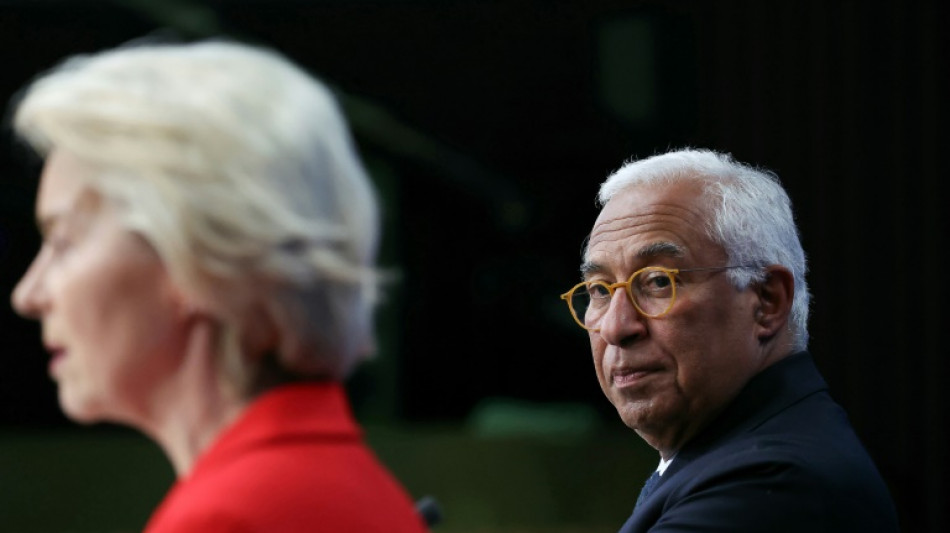
RBGPF
0.0000

EU bosses Ursula von der Leyen and Antonio Costa are in Beijing on Thursday for talks with top Chinese leaders over areas of friction from trade to the Ukraine war -- with low hopes of a breakthrough on any front.
Beijing has sought to draw the European Union closer as it positions itself as a more reliable partner than the United States and a bedrock of stability in a troubled world.
But the EU has made clear it will confront deep divisions over trade, fears that cheap, subsidised Chinese goods could overwhelm European markets and Beijing's tacit support for Russia's war against Ukraine.
Though nominally intended to celebrate 50 years of diplomatic ties, the long list of grievances set the stage for a contentious summit.
Brussels has pitched Thursday's talks between its top bosses and Chinese President Xi Jinping and Premier Li Qiang as "a clear opportunity for detailed, frank, substantive actions around all aspects of our relationship".
"We know that we don't see eye to eye with China on many issues," a senior EU official told AFP last week.
"But we believe that it is essential to have this kind of very direct and open and constructive conversation sitting at the table at the highest level."
Top of the agenda for the EU is the yawning trade deficit with China that stood at $357 billion last year and which von der Leyen has described as "unsustainable".
Beijing has dismissed those concerns, insisting that Brussels must "rebalance its mentality" not its economic ties with China.
- 'Not naive' -
Von der Leyen has also said Brussels will demand that China eases market access for European companies and loosens export controls on strategically crucial rare earths.
The EU has imposed hefty tariffs on electric vehicles imported from China, arguing that Beijing's industrial subsidies unfairly undercut European competitors.
China has rebuffed that claim and announced what were widely seen as retaliatory probes into imported European pork, brandy and dairy products.
A second key source of friction is Russia's war in Ukraine -- Brussels says China's deepening political and economic relations with Russia since the 2022 invasion represent tacit support for Moscow that have helped its economy weather sweeping Western sanctions.
Last week, the bloc adopted a sweeping new package of sanctions on Russia over the war -- including on two Chinese banks, leading Beijing's commerce minister to issue "solemn representations" to his EU counterpart.
"This is a core issue for Europe," the senior EU official said.
"We know that Chinese companies supply around 80 percent of the dual-use goods to the war," they said, referring to goods with nominally civilian uses but which can also have military applications.
"We're not naive. We're not asking China to cut relations, but to step up the customs and financial controls."
- Downward trajectory -
Beijing said this week ties with the bloc were at a "pivotal juncture" as both economic giants contend with an aggressive US trade strategy under President Donald Trump.
"Against the backdrop of increasing international turbulence, rising unilateralism, and rampant protectionism", the summit "serves the interests not only of both parties, but also of the whole world", foreign ministry spokesman Guo Jiakun said.
Brussels has sought to temper expectations but pointed to areas like climate where it wants China to do more but where cooperation is seen as more feasible.
"The EU doesn't expect breakthroughs from this summit but sees it as a chance to keep communication channels open with Chinese leaders while it works to carve out its geopolitical role and reduce critical dependencies," Marta Mucznik, senior EU analyst at the International Crisis Group, said.
Other analysts agree that concrete progress on any of the hot-button issues is unlikely.
"We should expect a very difficult moment," Abigael Vasselier of the MERICS think tank told a briefing this week.
"This summit is not going to change the course of Europe-China relations, which is one of deterioration due to structural issues," she said.
"Europe needs to be ready for a long-term struggle and probably needs to rethink its China strategy at this stage."
H.Dolezal--TPP